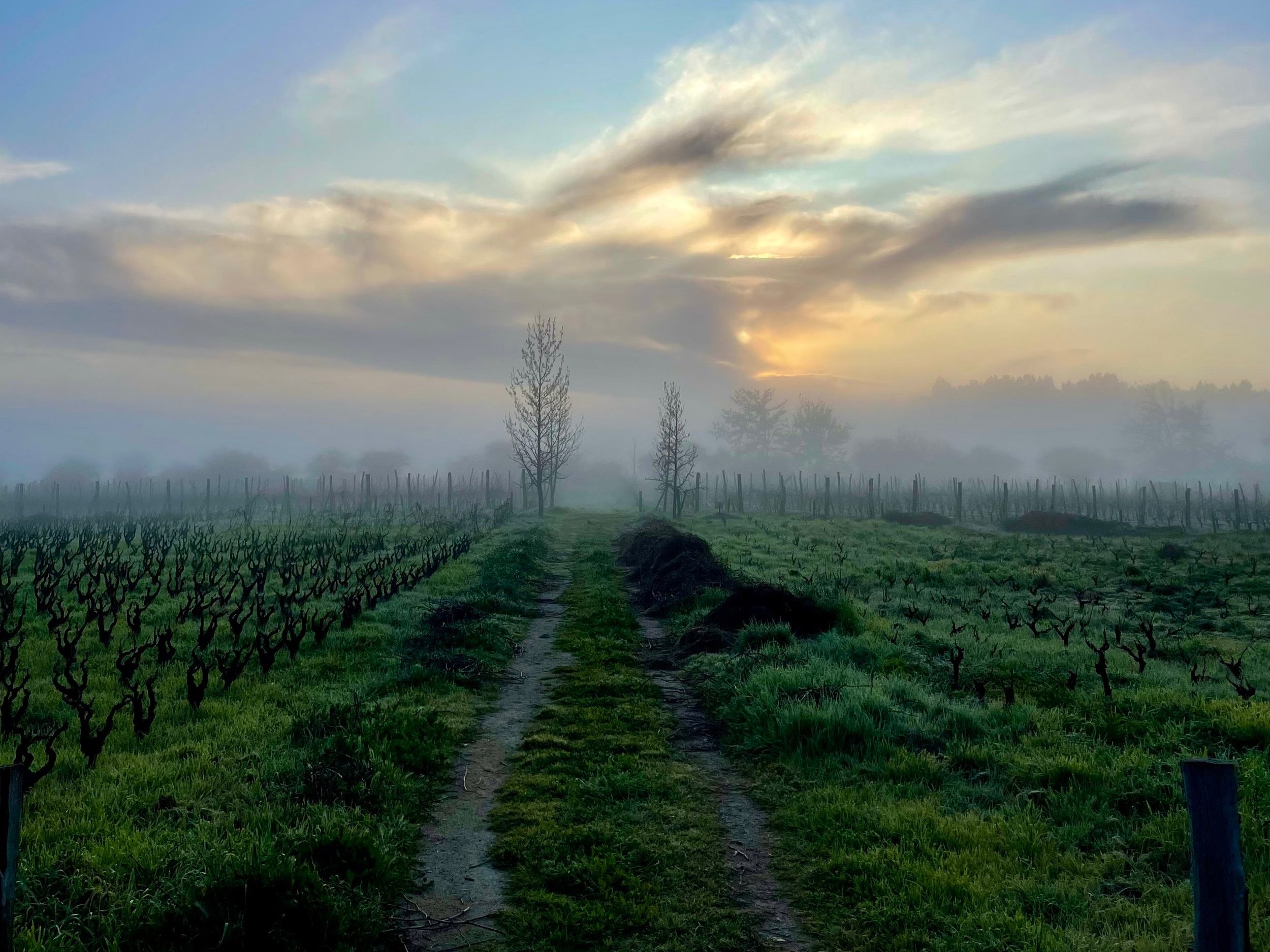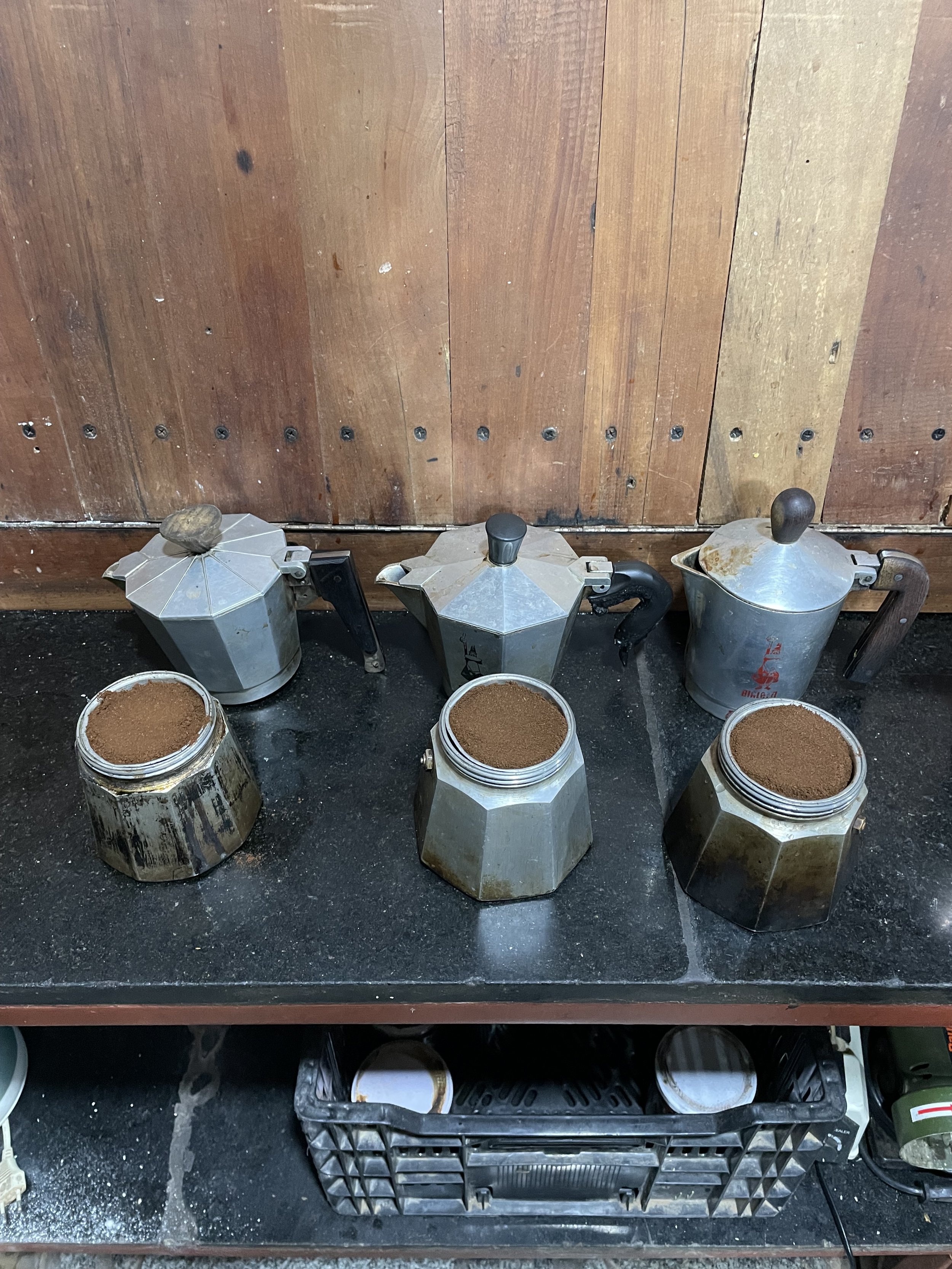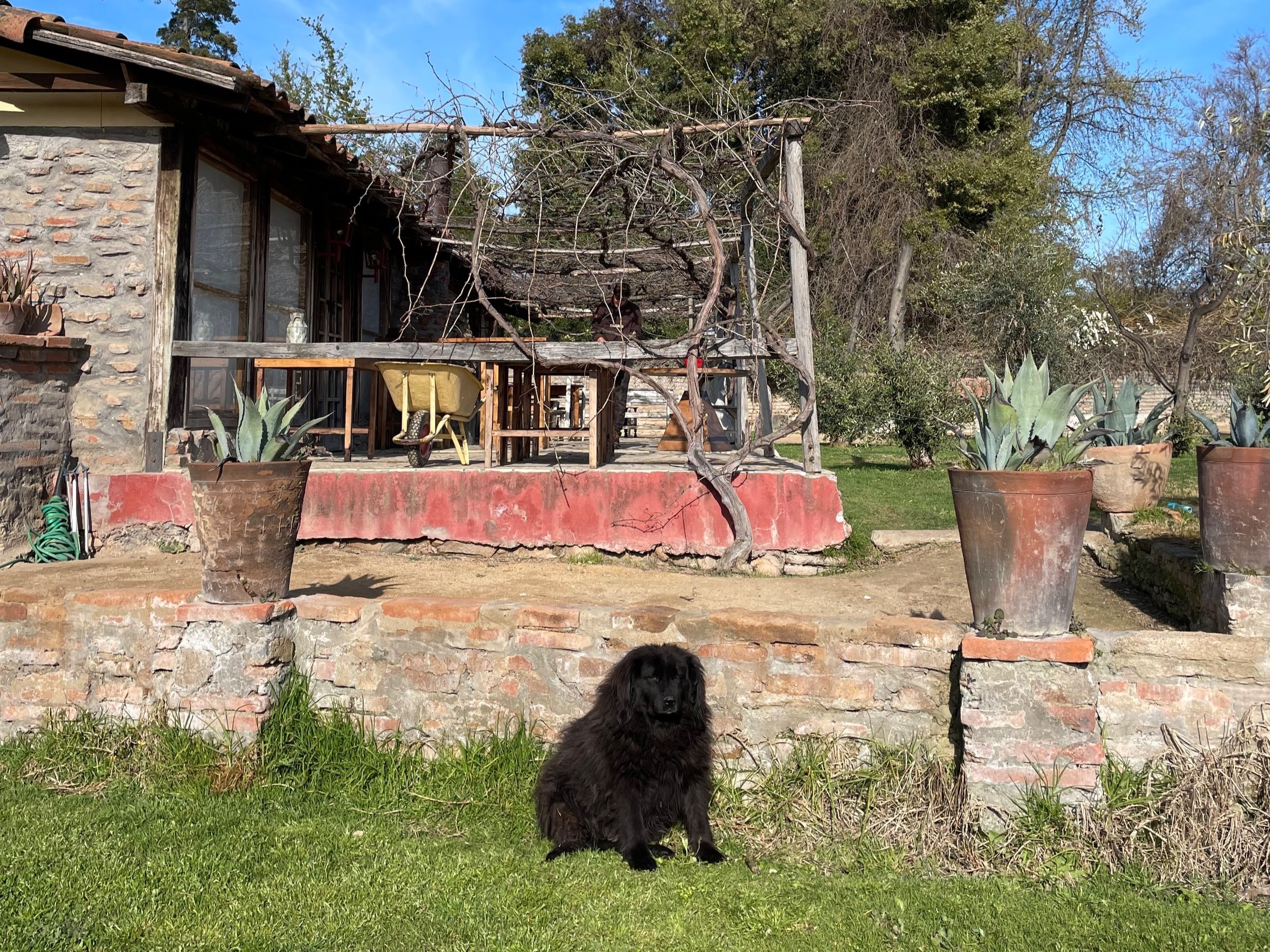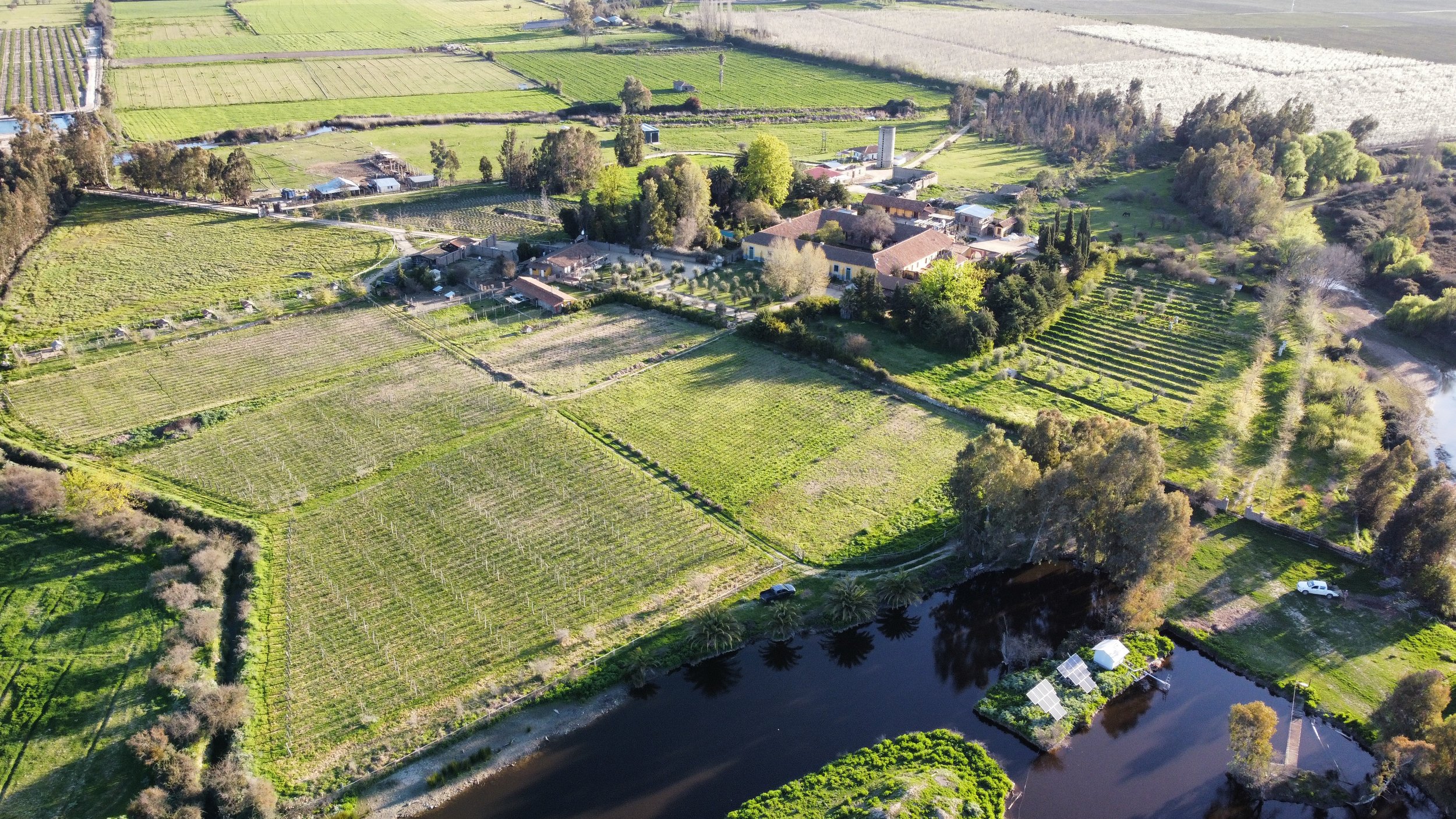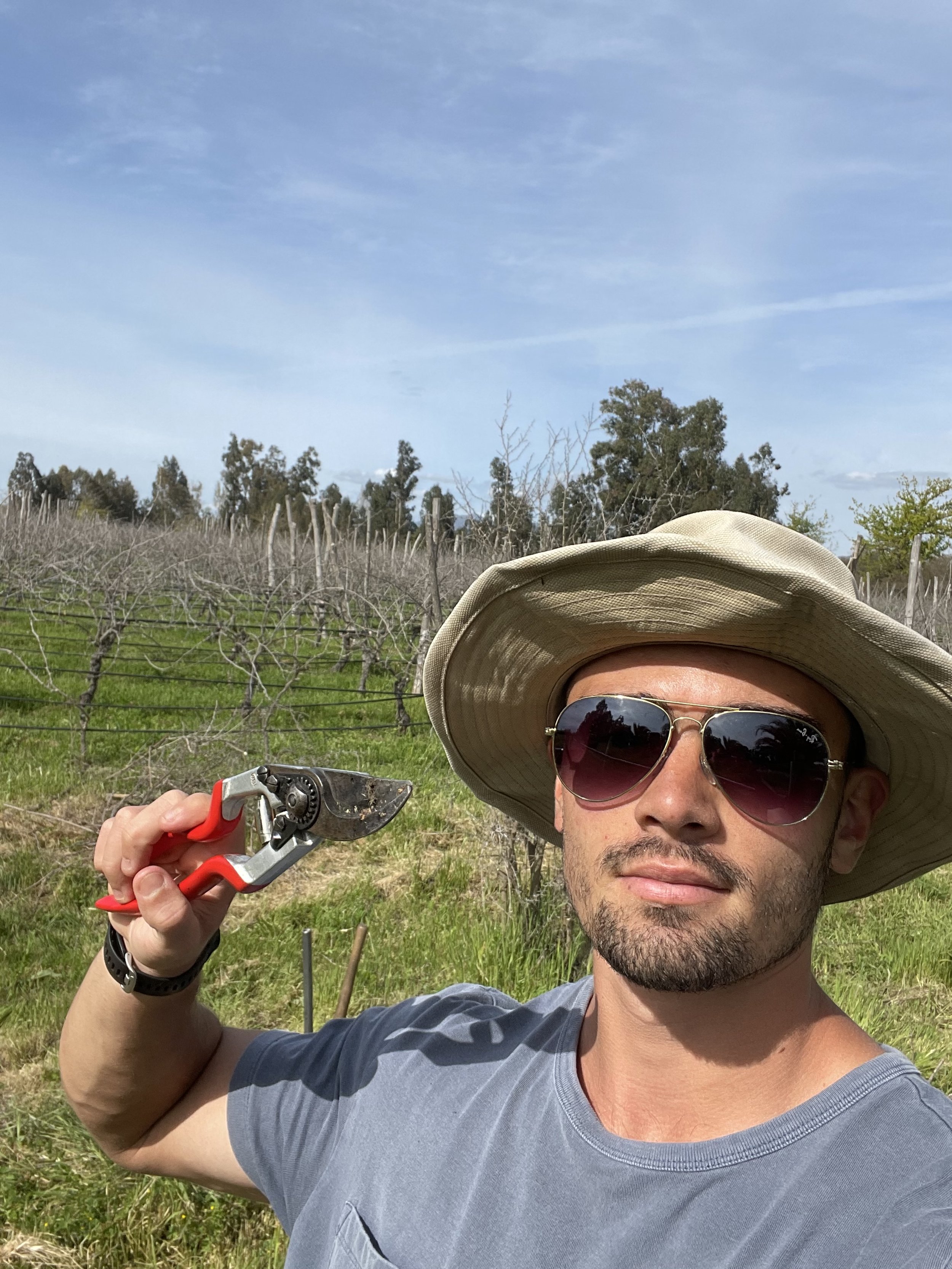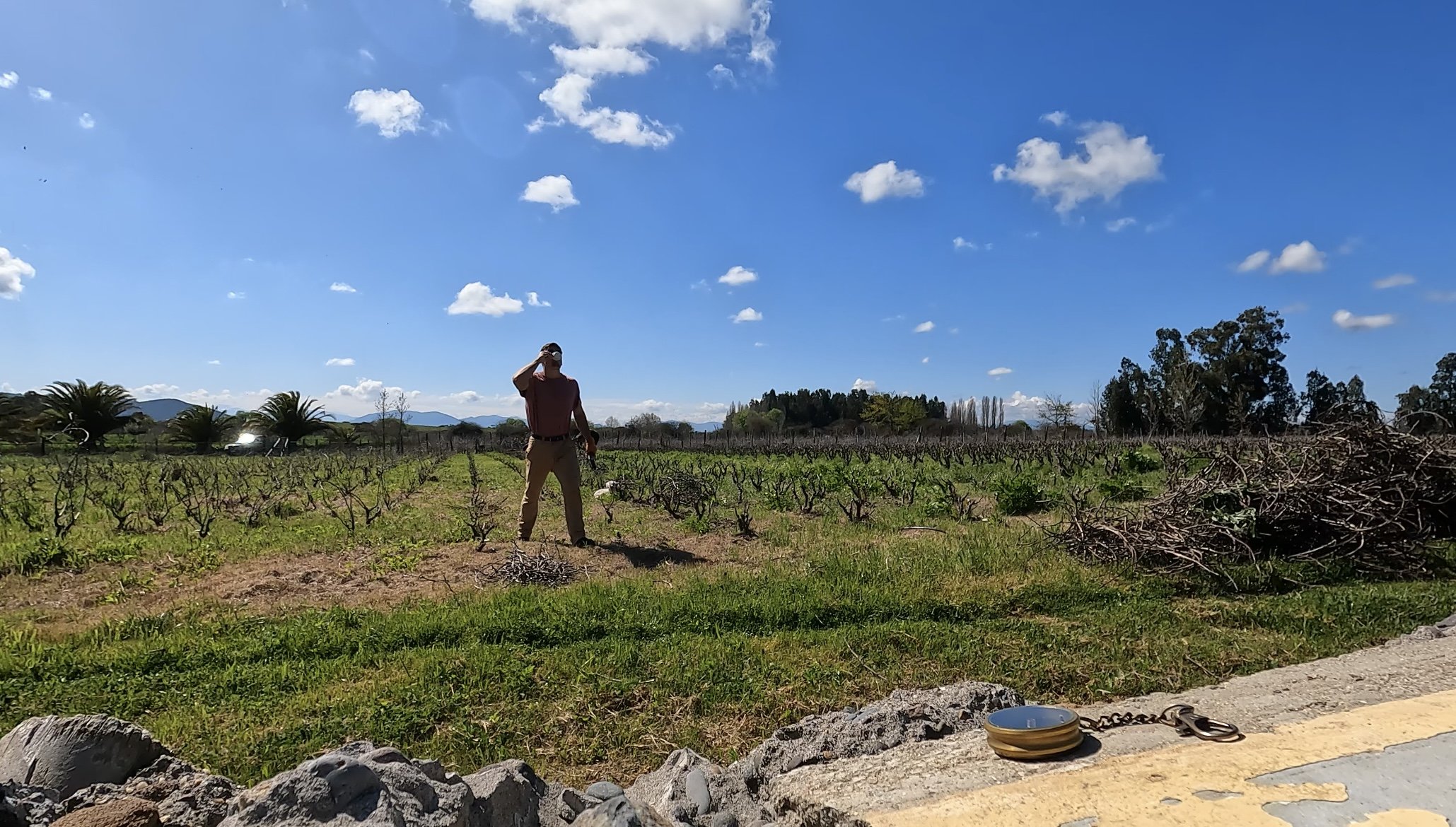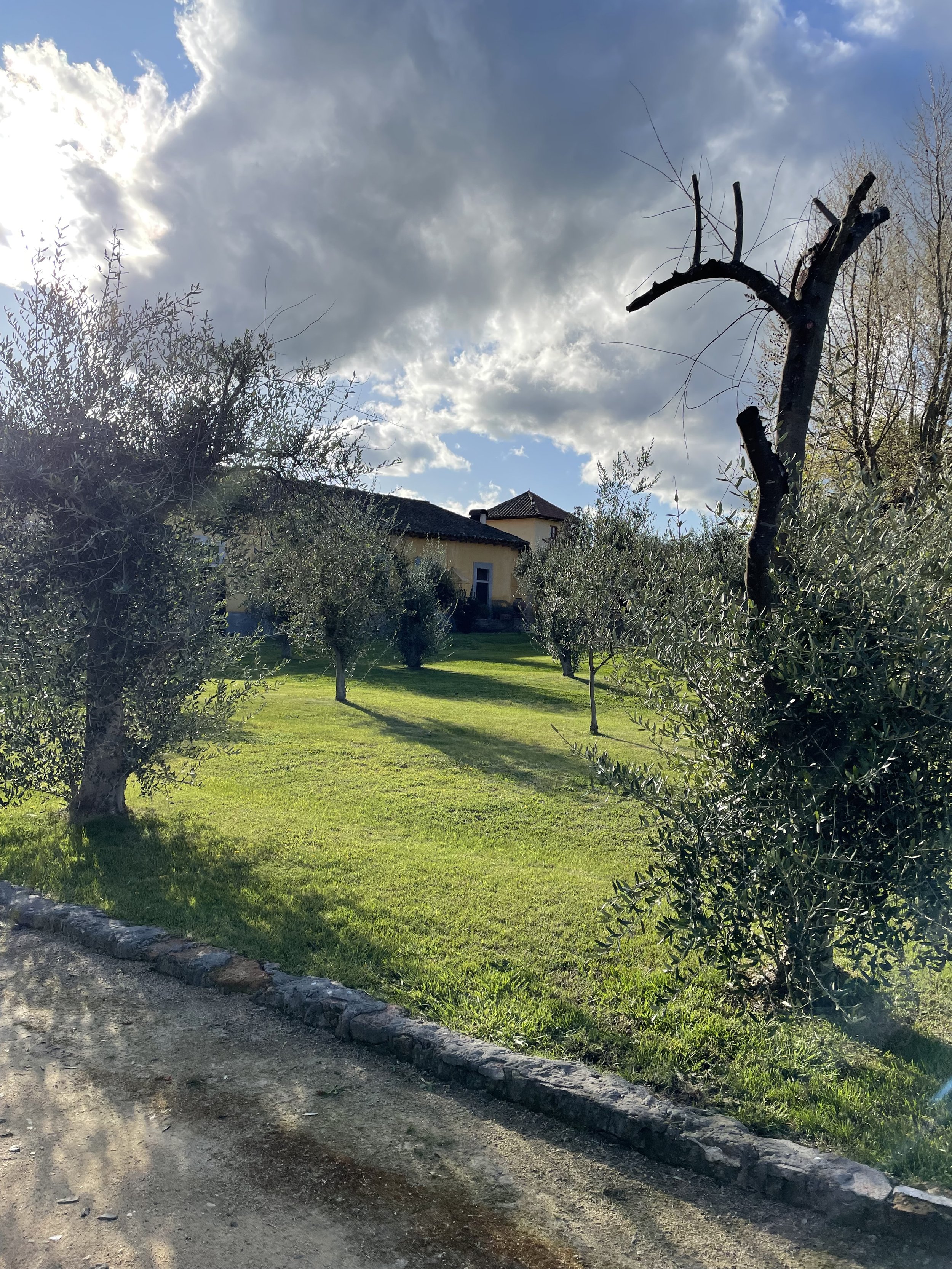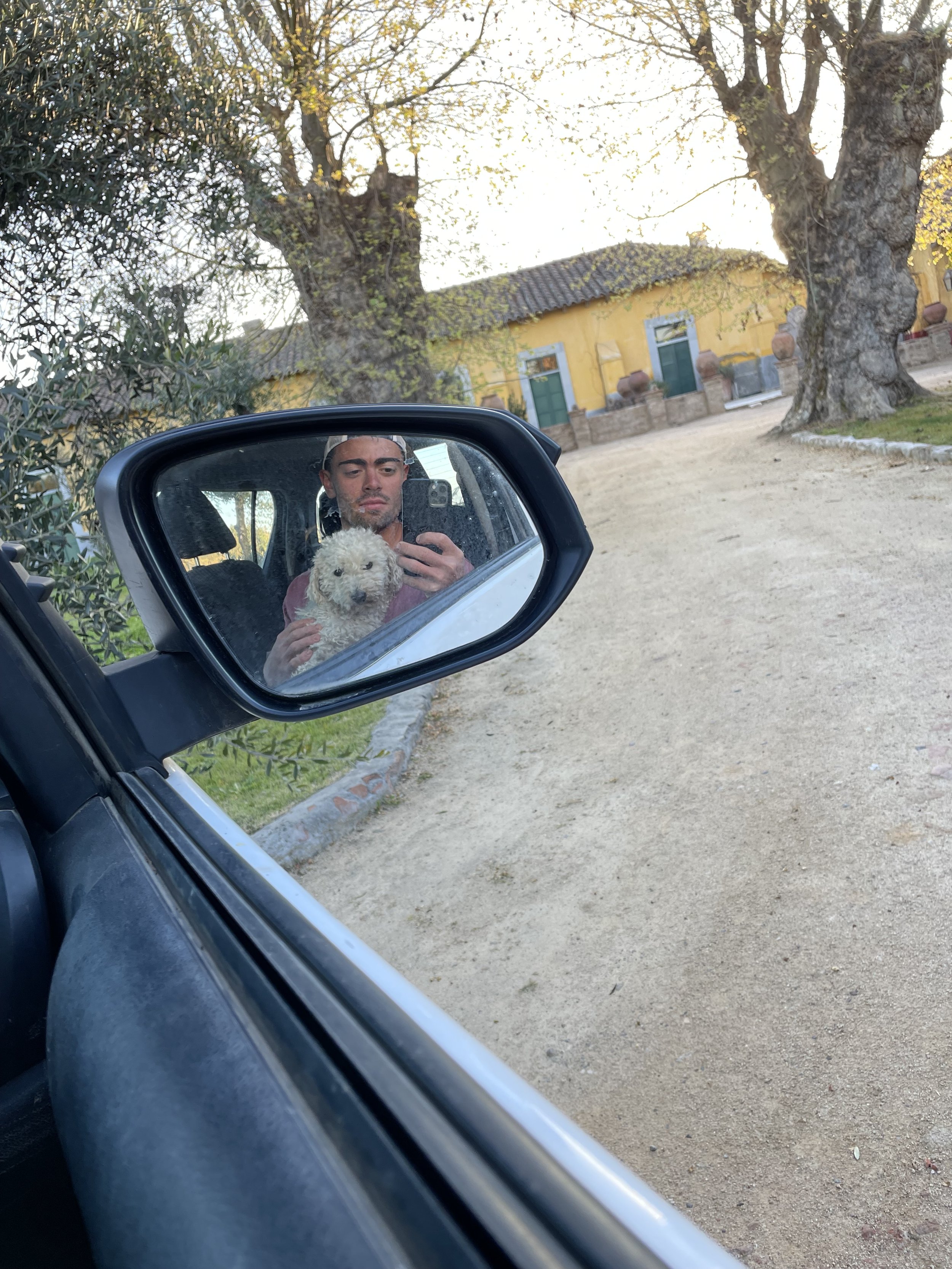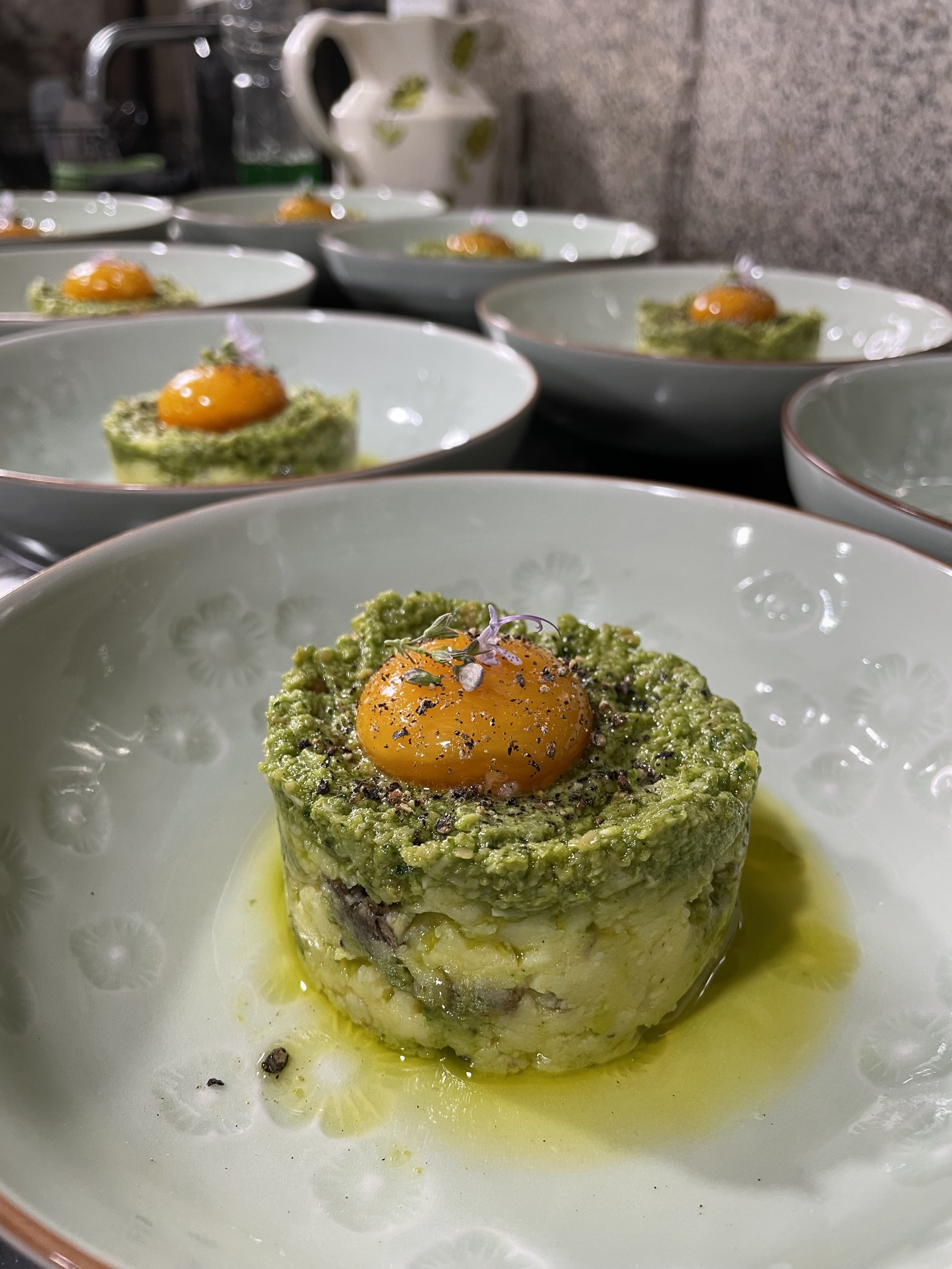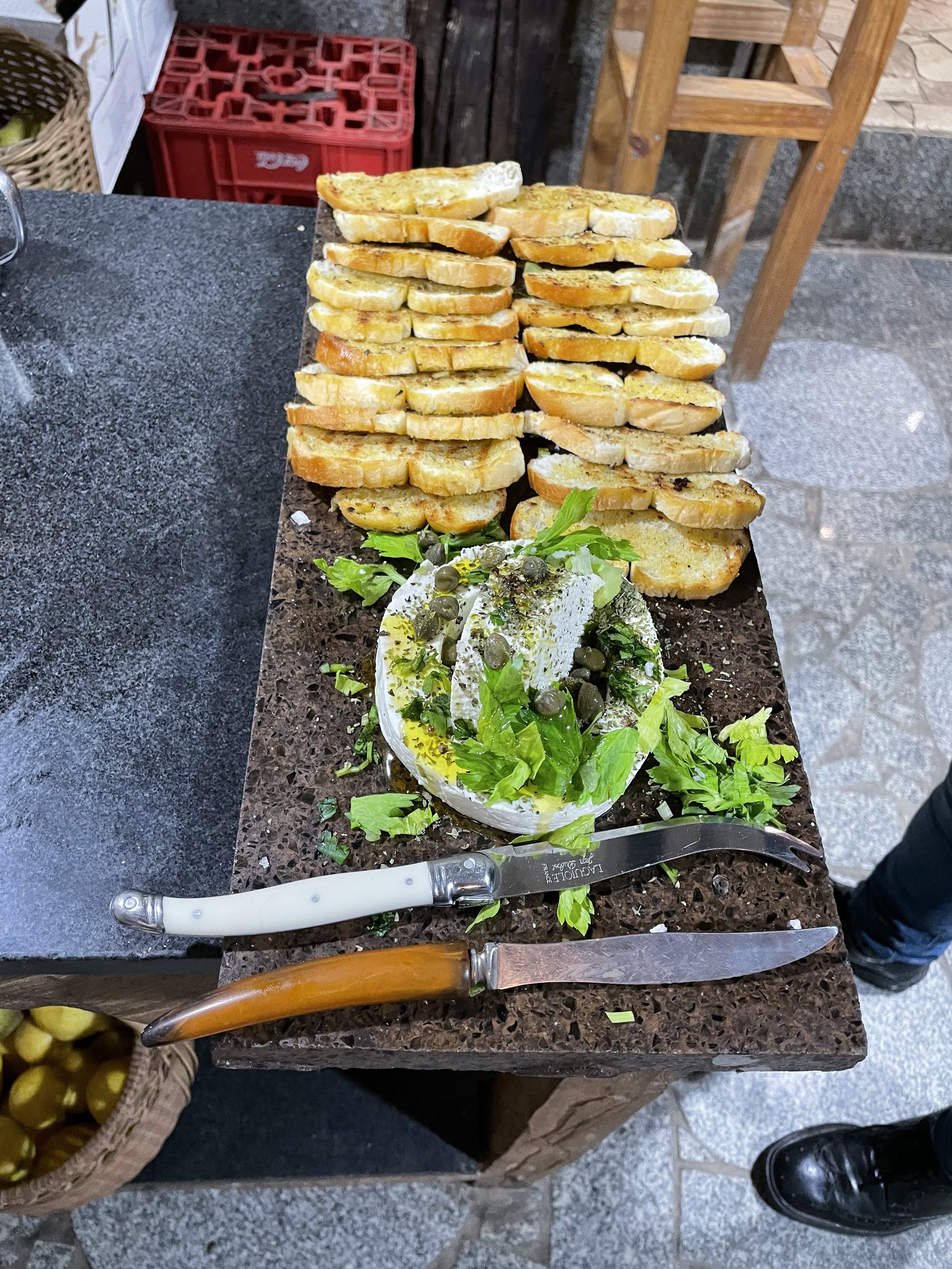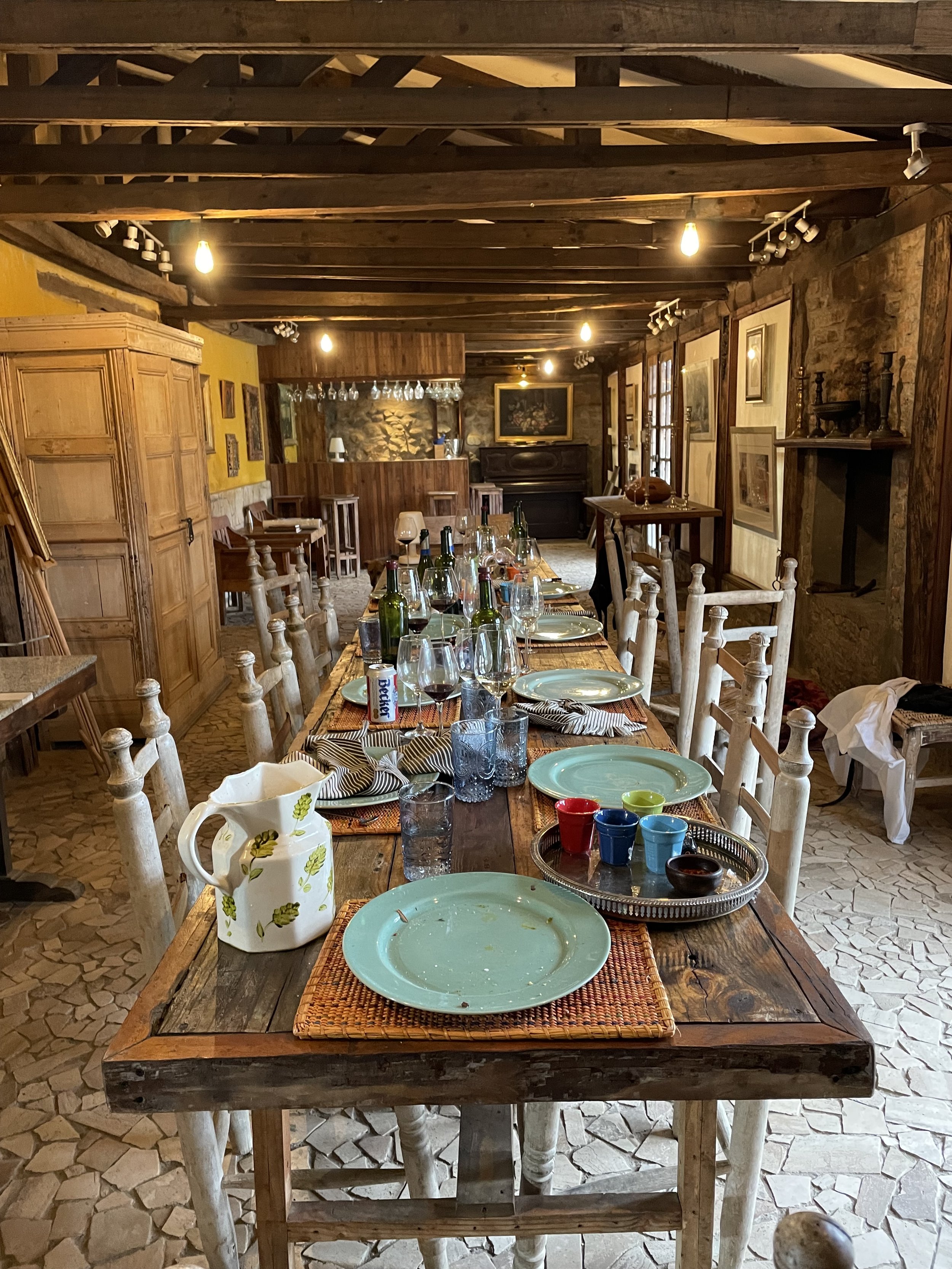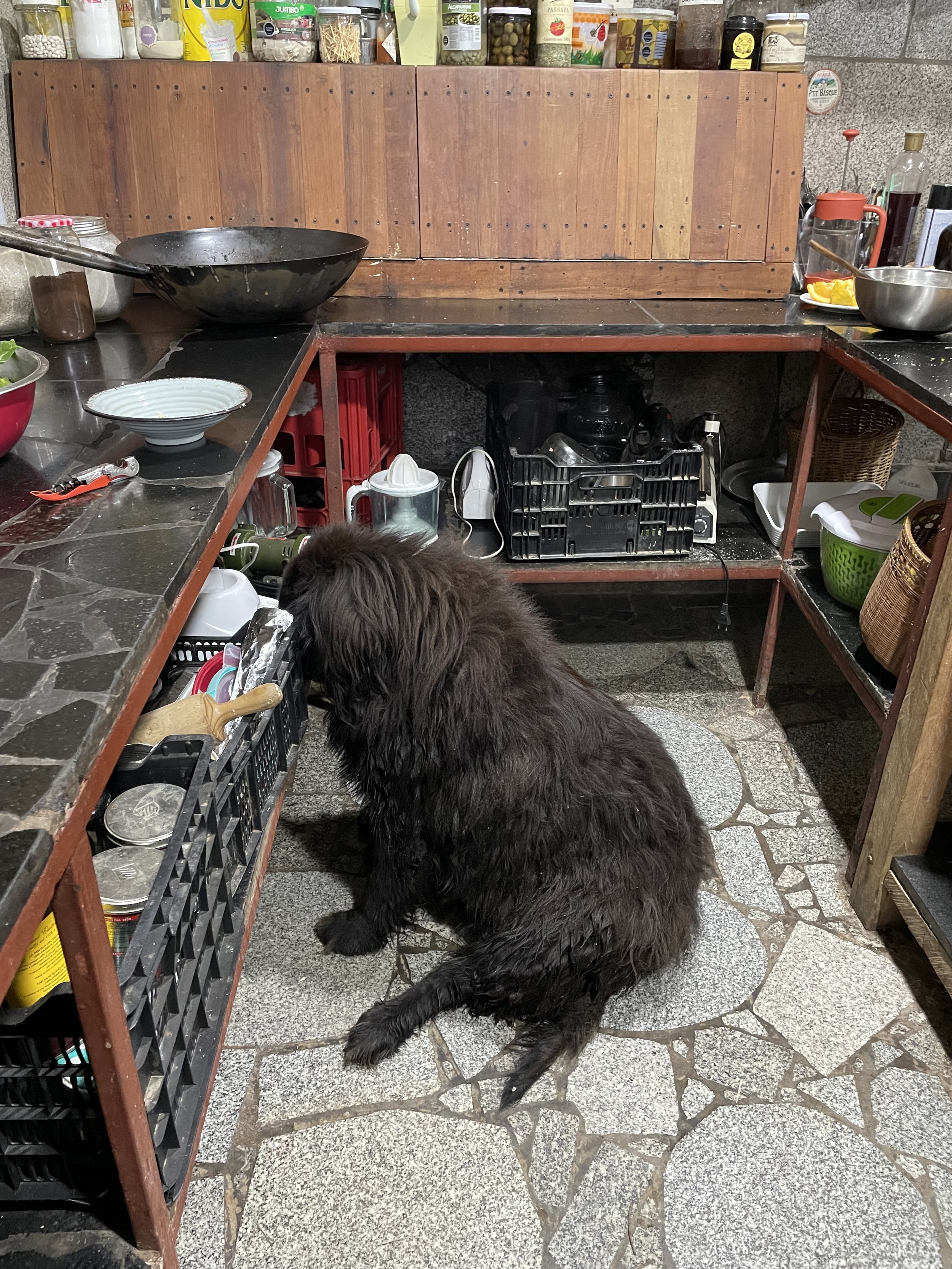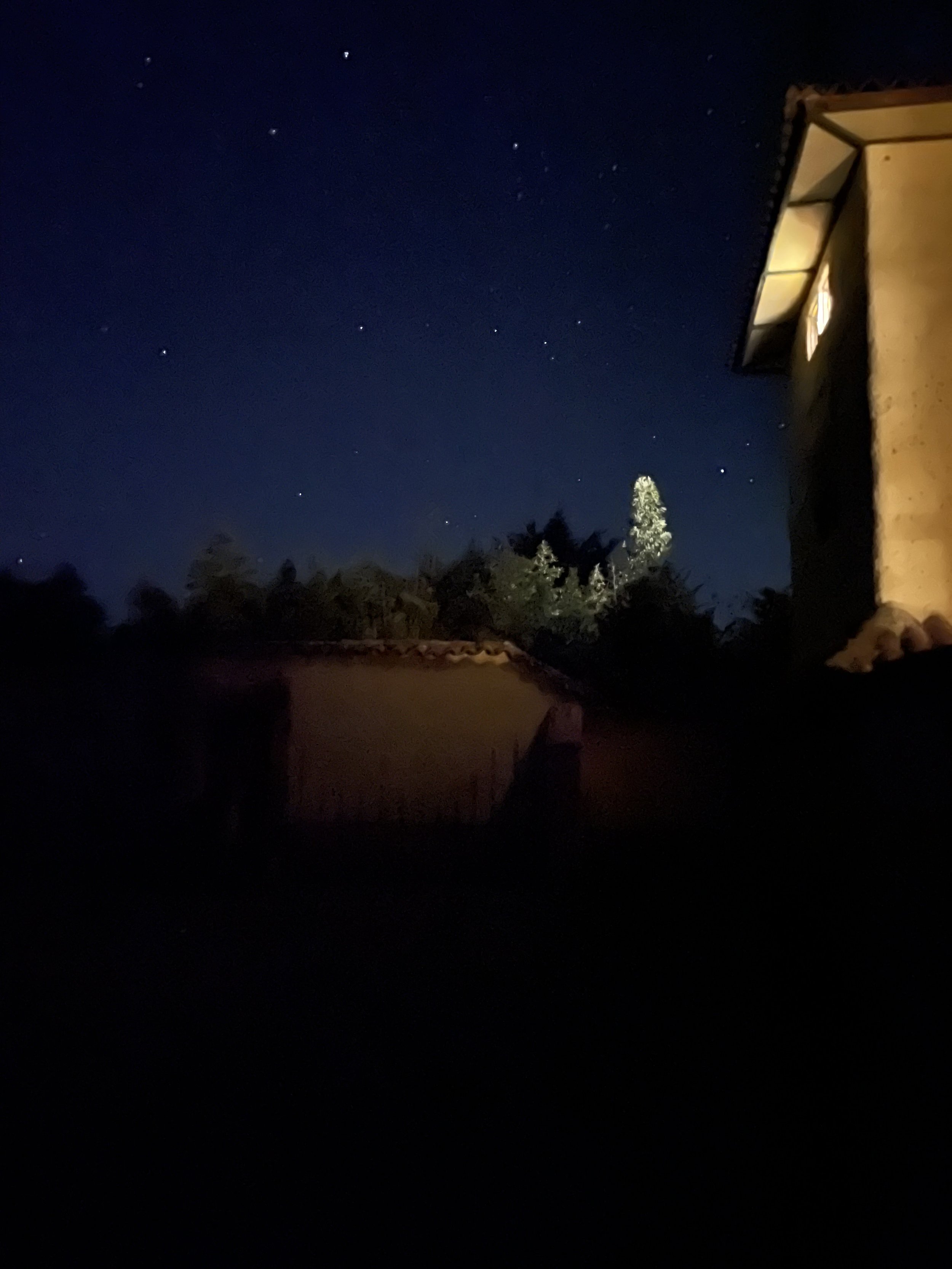Around the Clock on the Clos
7:00
A digital screech pierces my disgruntled sleep, extinguishing any hope my body had at recovering from inhaling equal amounts of fire smoke and wine yesterday evening. I shuffle around in bed and pull my phone out from under me: 7 AM, an alarm set every night in delusion.
I glance to my right at my clothes draped over a chair: tan work pants, Target-brand t-shirt, Asics pullover. All are covered in varying proportions of mud, twigs, olive oil, and dog excrement.
It’s 0℃ outside. The couple of logs I left burning in the chiminea have been reduced to ash overnight. You’d need a legion of warriors to drag me out of my comfy, warm bed. I hit snooze.
Twice. Thrice. Four times. 20 minutes until showtime.
Reluctantly, I swing my feet down onto the frozen cobblestone floor and reach for my pants.
8:00
Negra and I cut through the biting morning air on our way to the Chilean estate’s annexed kitchen. Her big black frame waddles in my wake, tongue out and panting from the brisk walk. Morning fog hangs suspended just above the vineyard. This view warrants taking the long way around. As the day warms, the fog will dissipate to reveal a magnificent backdrop of snow-capped Andes ridges on the horizon.
The Clos at dawn
The resident helping hand Martina has already started a fire in the dining room, but the annex is still far from warm by the time I enter. Bidding Martina a “buenas”, I bury my hands in my sweater pockets and turn to her animated kitchen companion.
Felipe, Martina’s 5-year-old son, is full of energy per usual. He mimes sipping a cup of coffee and salutes me by drawing it away from his face while shouting a long “cappuccinooooo” like he’s Salt Bae. This, I’m proud to have taught him in such a brief time on the vineyard—Martina is less impressed.
Théo, my French counterpart here, is already making the dough for our fresh bread and shredding apples for the fruit salad. It’s our role every morning to prep breakfast for ourselves and the vineyard’s owners. A quiet backpacker, fulfilling volunteer requirements for his engineering degree back on the old continent, Théo outranks me with tenure at the vineyard.
I don’t dare challenge the French for bread-making supremacy, so I commandeer beverage duty for the mornings. After squeezing some oranges for our juice, I flit over to the tea and coffee. These would be simple maneuvers save for Felipe physically wrapping himself around my right leg like a child-sized boot.
Morning protocol calls for three moka pots and one French press, prepared with espresso blends imported directly from Italy. While I consider it a sin to drink it from a presa francesa, I prep both brews. Letting Felipe push down the mechanism on the French press normally liberates my leg anyways.
Morning coffee prep
9:00
Marco, the Italian owner of the vineyard, pulls a few more pieces of fresh bread from a baking sheet in the fireplace and bundles it into a small wicker basket held by the vineyard’s Chilean elder, Sergio.
The pair have a curious past, only gleaned from the passing conversations and stories told in excess around every meal. The two balance each other quite well. Sergio runs the distribution of the wine and Marco its growth and production.
Sergio is relatively calm and composed, undoubtedly a result of his 40-year career in diplomacy. Marco reminds me of a pirate on the other hand with his bald head, white beard, and rosy round face. His past is that of a deeply rooted Tuscan family who found wealth through art collection.
The bread isn’t the only thing on the vineyard made as if we’re in the Stone Age. The philosophy at the Clos, a French word for a small vineyard, is to make as much as possible by hand and waste nothing in the process. This philosophy envelopes the furthest reaches of the Clos evidenced by cement walls reinforced with empty wine bottles, firewood yielded from broken-down shipping crates and pruned vines, and garden compost sourced from any discarded scrap of food.
Built by bottles, boxes, and Chilean Bordeaux
The bread pairs exceptionally well with the apricot jam Sergio buys from a family in the nearby township of Población and pairs even better with the sharp block of goat cheese we source from a farm in the south of Chile. I typically consume about one of the three pounds on the cheese block alongside my fruit salad, couple of eggs, and mashed avocado. Lunch doesn’t come for a while around these parts.
Marco, Sergio, and Théo are talking about something in French. Marco and Sergio each speak six languages due to their former lives abroad. The conversation naturally shifts into Spanish and then English before flowing back into French like an expert-level Duolingo lesson. I sip my coffee amid the game of trilingual telephone and silently run through some of the elementary French phrases I learned the day prior.
10:00
The sun has finally poked out over the Andean cordilleras on the eastern horizon and warms the day quickly. Temperatures fluctuate swiftly in Chile’s Colchagua Valley—it’s one of the factors that prime this region for wine-making. Having finished washing the dishes from breakfast, I step outside, strip my sweater, and leave it hanging on the same wooden beam of the patio as always when headed to the shed.
The patio and shed in question
Théo and I gear up our the morning gauntlet: feeding the 40 dogs of the Clos. I outfit my yellow wheelbarrow with nine silver bowls, a six-gallon drum of dry dog food, a rake, a dustpan, and a bag half-filled with feces from the day before. Spinning around, I’m immediately face-to-snout with the most eager of the canines on the property. It’s imperative that I oversee the dogs while they dine and ensure each eats their full bowl without stealing from the others.
I’ve come to know each of the dogs and their breakfast tendencies by now.
Hannibal is always first to eat, first to bark at you if he’s not, and also first to steal another bowl if not properly supervised.
Rinaldo, a mini-white poodle, only eats when fed out of Théo’s hand.
Pirula wobbles around the lawn, certainly no less than 15 years old as evidenced by her utter lack of bowel control.
Sisyphus (a name I gave him after the character in Homer’s Illiad) is doomed to forever spin and scratch his butt on the ground while never quite satisfying some awkwardly placed itch.
Niña is the biggest pushover on the property and will inevitably lose half her bowl to Hannibal.
Bertrand, the beautiful golden labrador, is more likely to go off and steal another egg from the nearby goose colony than finish his food.
And then there’s my favorite morning companion, Negra, the black, overly-fluffy, chubby Aussie resembling more bear or cow than dog. It’s been hard to get Negra to eat lately; she’s too obsessed with catching the rogue mouse that scurries around the food shed.
Queen of the vineyard, La Negra
I move on to the next of the five feeding spots across the grounds. Feeding the dogs will take up the next hour and a half as Théo and I tackle the massive property as each group of dogs sticks to a certain area.
Unfortunately, Théo poop-scooped yesterday, so I hold the reins today. As I scoop and meander the estate, Théo makes sure to toss some corn to the 12 chickens and lone peacock in the nearby coop. The colorful fowl maintains its self-delusion that it’s also a fellow chicken.
We check for eggs, but the coop only yields three today. The chickens are always on edge as they’re antagonized daily by the dogs on the other side of their wire enclosure.
Even birds can have an identity crisis
11:00
We finish with the dogs early. Rather than a break, this means extra time for pruning. Théo and I have been prepping the vineyard for springtime for the last two weeks. In a few more, the vines should start flowering and spitting out grapes for the harvest season.
My hand cramps from countless cuts through live branches, and my back spasms from stooping to cut the ground-level plants, but the stillness out in the field makes it manageable.
The way Marco has us pruning is sort of like a puzzle. Identify which five shoots of the plant to keep. Cut and discard the low, the inside, and the dead.
The Mission
Théo and I prefer to work in silence for the first part of each day. It’s just myself, the beating sun, and the birds. For a while, the only soundtrack besides the snipping of shears is the cawing from the other 30 peacocks that live on the Clos. The story of how they arrived here has yet to be revealed over a bottle of wine.
Once the bird calls wear out their welcome, I throw my proprietary “Bad-Boy Rock n’ Roll” playlist on a speaker. Théo and I normally start with this one. There’s no internet in the valley, so we’re at the whim of my random assortment of downloaded albums once the playlist runs its course.
I enjoy working to rock the most. There’s just something that feels right when pruning a vine while Fountains of Wayne jam about Stacy’s mother.
The Agent
12:00
The sun is properly out now and beats down on my already-burnt neck.
Our goal is to prune anywhere between 200 and 300 plants per day. Realistically, this should cover almost all the small vineyard by the end of my time here in a week or so. I fancy the idea of buying a bottle of 2023 from the Clos and knowing that trimmed up the plant that produced it.
The music shifts to “Elvis Presley’s Greatest Hits”.
Noontime among the vines
13:00
Pruning vines for hours on end finds a particularly meditative rhythm. The days spent out here are when I’m the most reflective on where I’ve been so far and where I’d like to go. Living with world travelers of Marco and Sergio’s caliber has put more places on the map than I can possibly imagine visiting.
It’s an odd feeling to have total freedom as to where I go next. Traveling solo springs me from heeding anyone else’s agenda but my own. Consequently, that freedom and all the decisions that come with it can be overwhelming. It feels like choosing one route shuts the door on ten potential others. Go north, and forfeit experiences south. Go east, forfeit west. Of course, it’s never this black and white, and there are always other opportunities to visit those places left behind. It never quite feels like it in the moment though.
Planning routes on Marco’s 18th century map of the Southern Continent
I opt to further procrastinate my election of a next destination, and leave my thoughts to wander back on my sitcom-worthy experiences on the Clos.
There have been nights when I’ve helped cook five-course meals late into the wee hours of the morning for over a dozen tourists.
I’ve tended to a wood-fired pizza oven while two Argentinian car mechanics recited stanzas of the holiest of gaucho texts, the epic poem of Martín Fierro.
One day I traveled with Marco and Sergio on the rocky coast to strike a wine deal with a Michelin-recognized restaurant.
Another night, we mock-officiated a wedding between a young Brazilian couple. Sergio wore a handcloth around his neck as the reverend while Marco waved a bushel of parsley as if to sage.
Standing among them all, the night that sticks out as the most head-scratching was a recent overnight trip to Santiago that Marco and Sergio brought Théo and me along for. Pushing through the choked rush hour of the capital, we picked up 300 oysters from a local fishing operation based out of the southern island of Chiloé and a dozen baguettes from a French baker.
At their flat in the capital Santiago, we prepped four types of homemade mayonnaise and a fine array of pastries just in time to host an evening get-together with Marco and Sergio’s friends. Among the attendee list were the ambassadors to Chile from Austria, Malaysia, France, and Germany, a French opera singer who later performed acapella, and a Spanish communications officer who did well to reinforce his nation’s stereotype by smoking a pack by the hour.
The night reached its peak when the Spanish officer’s artsy, young girlfriend began exhibiting her latest vaginal-inspired works to the white-haired attendees. Nothing is quite so entertaining as watching international bourgeoise react to interpretive, sculpted renditions of a woman’s genitals.
As I sat sipping wine with all the diplomats, Théo and I could only manage to flash knowing glances at each other as if to say “How did we end up here again?”
French ambassador in town? Would hate to disappoint.
14:00
“Shay! Time for lunch!”
Marco signals us in for lunch right on cue. He and Sergio tend to call me by a mix of names ranging between “Che”, “Ash”, “Shay”, and “Dash”. Yes, they’ve seen my nickname “Chaz” spelled out. I just chuckle at what I hope is an ongoing joke.
The call for lunch comes at a good time; three hours in is about when the hunched spine needs a break. Sure, I could squat for pruning, but the motion only tends to slow me down.
While we prep breakfast and dinner with him, Marco tends to make us lunch while we’re out in the vineyard. Théo and I take turns stretching each others’ backs as Marco puts the finishing touches on his pasta aglio e olio and apple-celery salad.
Typical lunch: handmade, healthy, hearty
I take a Chilean Becker beer from the fridge and sit down at the outdoor table. Marco and Sergio start a conversation about some new political issue. I scarf down noodles as they ramble, surely looking no more civilized than the dogs attacking their first bowl of chow in the mornings.
15:00
The moka pot whistles on the stove. I pluck it off and bring it back outside to the annex patio. We never adjourn lunch without a prolonged moment for a digestivo and dessert. Today’s is a pisco-carmelized orange slice with sugar and marrón glacé. Gluttony is a resident deadly sin on the Clos.
Marco lets Théo and I know that the mission for the rest of the day has changed. We have guests coming this weekend, so rather than pruning in the afternoon, we need to prep the house. This means sweeping the courtyard and going out to the very back of the property to find firewood. Priorities on the Clos are fluid, and this change in tasks doesn’t come as a surprise. We’re assured not to rush, so we take our time and finish our coffee among the grove of olive trees.
Lunchtime Views: the castle and its olive trees
16:00
Théo and I enter the primary courtyard carrying a wheelbarrow, one rake, and one broom. Rinaldo, the white poodle, is riding in the wheelbarrow.
16 tall, green, wooden double doors surround the dusty courtyard, each door a portal.
Open one to find guest quarters. Open another to find a dim passage to the bodega where the wine ferments. Another leads to a library made up of roughly 2,000 books and 500 DVDs in six languages.
The pool lies behind another. One contains the primary rooms, including a dining room and a globally sourced collection of statues, paintings, and platters with a value tallying somewhere around half a billion dollars.
Other rooms simply still sit unused and unrenovated. After 17 years and two earthquakes, construction of the Clos has yet to conclude.
A shelf that could make the most seasoned “movie-nighters” bend the knee
After two weeks, I still don’t know what’s behind each green gate. I’m under strict instructions not to open any closed door and risk seeing something I’m not supposed to. This only fuels my curiosity.
17:00
I’m putting the finishing touches on the courtyard. The wheelbarrow is full of sticks, leaves, and dog poop—freshly laid as we were cleaning thanks to Rinaldo. The defeating part about this outdoor clean-up is that it will be necessary again in a handful of days. The trees have little mercy. I dump the final compost outside.
Eager to wrap the day, Théo and I hop into the beat-up Toyota Hi-Lux and rev the white truck’s engine. Neither of us fully comprehend how to drive a manual transmission, but I decide to take the wheel and therefore the culpability if we crash. A few lurches and some stutter-stops later, I get us rolling through the tight paths of the vineyard. Rinaldo comes along with us for the ride.
Co-pilot Rinaldo
18:00
Théo and I split for a break until dinner after stacking a truck bed-worth of firewood next to the kitchen. Before I make it to my casita for a nap, Sergio catches me and requests I join him on a run into town to pick up some oil and marmalade. While tempted to decline, I make an exception on account of the marmalade. I’ve also learned by now to just nod and accept extra tasks that come out of the woodwork. It’s only temporary.
I can always temporarily run myself into the ground.
Gathering firewood in the evening sun
At a mini-market in Población, I’m pleased to finally meet the family responsible for the sweet jams I’ve been close to drinking every morning at breakfast. We stock up on mora (blackberry), damasco (apricot), durazno (peach), and cirvela (plum) at the going rate of 3,000 pesos a jar.
Sergio and I then hit the only grocery store in town, “Super Patito”. Named after the owner Pato, this store is one of five that make up the entire commercial side of Población. All are owned by Pato. Further down the block lies “Patito Tires”, “Auto Servicio Patito”, “Dónde el Pato” (a roadside restaurant), and “Hostería Patito” (lodging).
My host is convinced this Patito fella has cartel ties, each shop a different laundering front.
Pato sits on a stool outside the door of “Super Patito”, and Sergio greets him with the utmost respect. He knows it’s best to stay on the good side of the affair.
19:00
I crash into a hammock hanging in the courtyard with only an hour until dinner. I try to read my book. Given more energy, I might go for a run between farms, or given more time, I might catch up on sleep. Today I have neither.
Last weekend, we hosted guests both nights. The weekend before that was a holiday where we hosted guests for four nights. Here have visited other diplomats from Sergio's ambassadorial past, doctors of presidents, entire families, the nation’s largest wine magnate, young couples, and older couples—the entertaining never really stops.
These nights and afternoons are more often spent in the kitchen than in the vineyard. It’s a miracle when we have days that leave time for pruning and wine-making, much less free time to read, write, or rest.
Today is no different. Before I get one page into my book, my head nods onto my chest.
Journaling… what a pipe dream
20:00
Dinner prep starts at 8 PM sharp every evening. It’s only the four of us, so tonight’s meal should be a little more tranquil. While the work days are long, the meals do well to compensate. Marco's Tuscan roots are evident in his cooking. He never has used a recipe and won’t make anything with more than five ingredients. It’s pure majesty the way he’s able to pair seemingly uncomplimentary ingredients.
Since I’ve been at the Clos, I’ve helped him kick out mushroom risotto, pesto-potato towers, Spanish paella, salmon and sardines, avocado soup, beet soup, oysters, handmade pasta, and the list goes on. Tonight is French onion soup.
I pour a glass of wine and roll up my sleeves.
One of many “casual” dinners
Marco boils a bottle of the house vino blanco, and I start skinning the onions. We’ll caramelize them in another pot before adding them to the wine. As I peel, I take care not to make too much of a mess, or Marco will let me hear about it. “The best chefs clean as they cook”, he tells me.
While that might be the case, this is a questionable ask when cooking with Marco. There has been many a time where I’ve wiped down the counter around a pizza or a soup only to have Marco immediately throw a full fistful of salt directly back onto it. He’s lucky when 10% of the salt ends up on the dish.
Marco has plenty of other rules in the kitchen, but the one he remains most insistent on is that we keep our glasses of wine full at all times. I hold my empty one back out for a refill.
21:00
Dinner is served. Soup pot on a slice of tree trunk as a hot pad. French bread grilled with butter alongside. It’s a simple meal, and I take three bowls.
Stop it
Marco opens another bottle of red wine and pours himself a taste; he always tests his own wines before we can drink. Taking a sip, he closes his eyes and emits a loud “MMMMM”, falling into blissful delight. Never have I seen a man so consistently enamored by his own creations.
On the odd occasion that the bottle isn’t up to snuff, he takes it away and puts it on a shelf in the kitchen. Tomorrow, we’ll pour it into a barrel outside of the bodega to ferment into vinegar.
22:00
I dunk another plate into the washbin and gaze down the endless line of dishes to knock out before bed. There’s no dishwasher or hot water, so I’m at the whim of a tea kettle to sanitize the china. I work at its boiling speed and no faster. Next to me is another full glass of vino tinto to pass the time.
The CD player echoes softly through from the dining room. Despite three stacks of discs, the majority of Sergio’s collection is purely Madonna, French orchestra, and Neil Young covers.
The kettle whistles and signals time for another round.
23:00
Exiting the kitchen, I find Sergio and Marco still at the table. Théo has gone to bed already. Smoke is slowly filling the dining room with a haze—I’ve been meaning to clean the chimney for days now.
It’s story time again. I oblige dreary-eyed.
The “summer” dining room
Marco and Sergio's careers have taken them around the world and then some. It’s a treat to hear their tales as they serve as inspirations for future expeditions of my own.
There’s a story of a dive with sharks in Malaysia. A club they both love in Belgium where you enter on Friday night and don’t leave until Monday morning. Another is of Marco's family history: a distant ancestor beheaded and the result being sent to his wife’s doorstep. Sergio refutes this one which induces Marco to get up from the table and furiously scramble through old newspaper clippings to find proof.
I’ve heard oral histories of Portugal, stories about the Chile of old, the France of old, the Italy of old. Predictions about where world leaders’ actions will lead us next. How we’re all already damned. How every old city used to have a glory day, and how now there’s nowhere that can live up to its past.
Tonight, I decide I’ll play some devil’s advocate with this debate, so I pour myself another glass and settle in.
Direct from the source
00:00
There is no fuel left in the tank. This happens without fail every evening as we draw the night out while uncorking more and more bottles.
I’ve given up trying to drink water at the Clos. Marco has two sayings that he loves to remind me of: “Never drink water in public as it’s impolite” and “Clean your liver, but never your mind.” I think the latter was in reference to a ginger-turmeric tea he made once and has since used in any context involving drinks.
Far too familiar with the regret I’ll have from pushing far past the midnight hour, I bid everyone a good night and grab a piece of leftover bread from this morning to coax Negra back to the casita with me. I’ve implored her to sleep in the foyer outside my room to chase away the rats that sneak around at night. I’ve never seen her catch one, but her intimidating figure does enough to keep the critters in the walls.
No sensible rat is messing with this
It’s a clear night above as Negra and I walk. I can make out the constellations of Sagittarius, Crux, and others exclusive to the Southern Sky. Watching stars in a completely different sky than that of my friends and family directly north would put most in an existential mood, although the oddity of this life on the vineyard makes me feel more like a main character than a dot on the Earth these days.
The Southern Sky by light of Marco’s tower (bedroom)
In my cottage, I throw two logs into the chiminea and arrange my clothes for the next morning. This move, I’ve been pulling to milk some extra shut-eye. Negra situates herself on a blanket at the foot of my bed with a long, snorting exhale. I set my alarm for another unrealistic 7 AM wake-up and flop onto my bed, out before my face hits the pillow.


